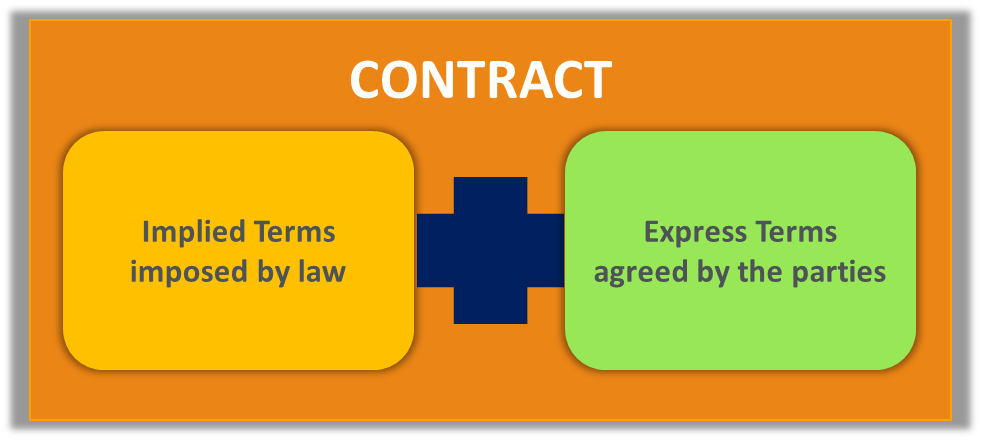A contract is a legally enforceable agreement between two or more parties. It creates obligations that are recognized and enforceable by law. A contract can be formed in the most modest ways, such as a nod to a statement of service provision, the exchange of legal cash, or the infamous trade by barter. Parties must intend for their agreement to have legal consequences, which is possible by conveying certain words or acts. Expressed and implied terms are the main components of an express or implied contract. These are straightforward words and suggested acts used in executing a contract. Understanding the difference between expressed and implied terms is crucial in contract law, as these terms determine the rights, obligations, and expectations of parties involved in a contract. In this article, we explore what contract law is and how to identify expressed or implied terms, the intricacies of these terms, and finally discuss techniques to identify them.
Expressed Terms
These are the provisions that the parties intentionally include in their contract, which can be in written or oral form. Expressed terms are directly articulated and agreed upon by the parties during negotiations or when drafting the contract; their validity is determined by whatever specific terms and/or conditions exist surrounding the agreement. These are clear, unambiguous, and easy-to-understand words, even for someone who is not a legal professional. Essentially, expressed terms are the words and statements that provide the guiding principles for a contract. Shawel v. Reade: A statement made three weeks before the contract was held to be a term. Esso Petroleum v. Mardon: Statements made by experts to laymen were considered terms. Oscar Chess Ltd. v. Williams: A statement made by a layman to an expert was treated as a mere representation.
Examples of expressed terms in a contract would be:
- A purchase agreement specifying the price, delivery date, and product description.
- A lease agreement outlining the rent amount and duration.
- A 12-month warranty for the purchase of an item.

Implied Terms
Implied terms are those that are not explicitly mentioned in a contract but are understood by the court to ensure the fairness and practicality of a contract. An implied term means that no one would care about the party’s intent if the actions implied the existence of a contract. Thus, the obligation to perform the job still exists. This is also known as implied by law, arising from the actions or conduct of the parties involved even without a written or explicit agreement. As an example, a passenger might enter a bus without any dialogue with the conductor or driver. There is an unspoken agreement that he would be taken to his destination, and in exchange, he would pay the fare. In Brogden v. Metropolitan Railway Co., the defendant was held bound by the contract between the defendant and the plaintiff even though the defendant never signed the document containing the contract. Both parties had been acting in conjunction with the contents of the unsigned document over a reasonable period of time, and so the contract was held to be an implied one. Examples of implied contracts are:
- Statutory: The Sale of Goods Act, passed by the British Parliament in 1893, is one example. Sections 12 to 15 of the act imply certain terms in a contract that are binding unless such terms are expressly excluded. The terms implied are title, description, suitability for purpose, sample, and merchantable quality. It should be noted that the Sales of Goods Act is applicable in Nigeria as a statute of general application in force on January 1, 1900. While the Western region and Lagos enacted their own Sales of Goods Law, the stipulations are practically the same.
- Through custom and practice: Based on certain localities and communal practices by the people in an environment, certain terms are implied by established norms and practices. The killing of a goat to accompany the buying of land in the eastern region of Nigeria is very well known and practiced.
Techniques for Identifying Implied Terms
When identifying implied terms in a contract, there are certain techniques you can use to help you.
- Reasonable and equitable: Firstly, you should consider the context of the contract. This means analyzing the subject matter of the contract, any industry or societal norms that may apply, and the intentions of the parties involved. You should investigate whether the contract is reasonable to the extent of enforcement. The enforcement of a contract should possess equity and fairness. You do not agree to a contract that cannot convey reason, investigating the terms used in a contract goes a long way toward protecting you as a party.
- It is necessary to give business efficacy to the contract: There are implied terms in certain contracts that enable the efficacy of the business of the said contract. This implies that a term should be included in a contract if it is necessary to make the contract work as intended. For example, in service contracts (e.g., consulting services), it is implied that the service provider will execute their services with due care and skill. This implied duty of care ensures that the contract achieves its intended purpose and maintains business efficacy.
- So obvious that ‘it goes without saying’: There are actions that without a doubt incur the suggestion of an implied term. This means that by carrying out that act, it is implied that a contract has been enacted, with completion implied by a corresponding action. For example, when you purchase a cup of coffee at a café, it is implied that you will pay for it. The payment expectation is so obvious that parties do not need to explicitly state it in the transaction. When you order a product online, it is implied that the seller will deliver the goods to your specified address. The delivery obligation is fundamental to the purpose of the contract.
- Capable of clear expression and not contradicting any express term of the contract: In lease contracts, tenants have the right to quiet enjoyment of the premises without interference from the landlord. This implied term does not conflict with any express terms and ensures a harmonious tenancy. Every contract includes an implied duty of good faith and fair dealing between the parties. This principle ensures that neither party acts in a way that undermines the contract’s purpose. It does not contradict the express terms but enhances the overall agreement. So, we see that implied terms are woven into contracts, and it’s important to verify and document all terms. Whenever possible, make all terms explicit. This helps to reduce the risk of disputes over implied terms. Comprehensive contracts are always better than incomplete ones.
Conclusion
In Nigeria, both expressed and implied terms play pivotal roles in contractual relationships. By understanding their nuances, businesses can navigate agreements effectively. Seek legal advice to ensure your contracts are clear, comprehensive, and free from ambiguity. Remember, clarity is the cornerstone of successful contracts!
References
- Schawel v Reade [1913] 2 IR 81
- Esso Petroleum Co. Ltd. v. Mardon: [1976] EWCA Civ 4; QB 801
- Brogden v. Metropolitan Railway Co: LR 2 App Cas 666
- Sections 12 and 15 of the Sale of Goods Act, 1893




